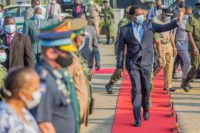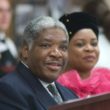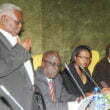The newly appointed Secretary General of Amnesty International says there a very few leaders on the African continent whom we can point at and say, “this is what a good leader looks like”, because nowadays, humble and selfless people turn against the poor upon assuming political office.
“African leaders, especially in the SADC region think winning an election is winning a lottery ticket to a lifetime of luxury and expensive living. Once they get into power, they go back on their promises and start stealing. I have seen how very good people can do very bad things,” said Kumi Naidoo.
“The worst disease we suffer in the word today is not HIV/AIDS, it’s not cancer, it’s not influenza it’s a disease I call affluenza. This is a pathological Illness where powerful people have come to believe that happiness and meaning only comes from more, more and more wealth. I mean, how much can one person or one family consume? Sadly there are not many presidents on the African continent that we can point at and say ‘this is what a good leader looks like’.”
Well, here in Zambia, we are remembering one such leader who served us between 2001 and 2008. Levy Mwanawasa was the opposite of the leaders that Naidoo describes across Africa. This is a man who put his country above everything else, and he carried a national vision to his very last day on earth.
Children who were only starting school at the time Mwanawasa was bidding farewell to the country are of voting age today. And we feel duty bound to share with them the memorable salute which this son of the soil gave following his death. It is a summary of what he stood for and what he envisioned for this country.
I want to say farewell to all the people of Zambia and I am grateful to all of you for giving me the opportunity during part of my life to serve you as president. It was a privilege which I cherished upto my death.
I did all my best to improve the standards of living of you my people. I strove to attend to the production of sufficient food for domestic consumption and for export, and worked hard to encourage investment both local and foreign so as to create jobs and enhance the growth of our economy.
I believed that national development could only be sustained if only good governance, respect for the rule of law and democracy were encouraged and not taken for granted. To spur these virtues, the fight against corruption had to be waged relentlessly and without treating anybody as a sacred cow.
I regret that in my zeal to facilitate this fight, I lost friendships, with some of my best friends and at many times, my own life and those of my family members were threatened. I want to assure the nation that no malice or ill will was intended in these initiatives. I was doing it purely for the love of my country and the urgent need to transform it from poverty to prosperity.
I have always been grieved to see so much poverty, hopelessness and anguish in the faces of our children – the leaders of tomorrow. It has always been my belief that nobody has the right to take away what we should be giving these children and put them in their selfish pockets.
I do hope that the party, the Movement for Multi-party Democracy can continue with this vision of our nation, pursuing the culture of zero-tolerance to corruption.
I was sad that some of you our members appeared to embrace corruption and actually criticize me for fighting the scourge. This vice will not develop our country. It is my desire that all future governments will continue to wage this fight.
If in my endeavours to provide only the best for my country, I offended some of my compatriots, I can ask is that they should find a place in their hearts to forgive me, as no deliberate intention to hurt their feelings was intended.
Indeed, Levy needed to apologise because under his reign, every government official who was prosecuted for corruption, including Frederick Chiluba himself campaigned for him to be president. This didn’t matter to Levy because the law was above everyone else. Levy’s corruption fight knew no political allies, friends or family. He started with cleaning his house first before facing those in his government.
When this man became President of Zambia only him was Head of State and not any other member of his family. There was no chikwela around the presidency among relatives. In fact, under Levy you stood a better chance of receiving (whatever kind of) preferential treatment you would seek, if you were not his relative.
His son Patrick, who is the current Permanent Secretary for Eastern Province, tells a very interesting story about how his father, as Head of State, slapped him hard for merely expressing interest to participate in a tender for a government contract.
Similarly, a journalist once asked Levy at the airport for a comment on a land ownership saga in Lusaka which involved his daughter Mirriam. The President responded that the said Mirriam was an adult who was capable of reasoning on her own, adding that, “if she has broken the law, I am instructing the police to arrest her right away”.
That is how Levy perceived governance. To him, winning an election was never perceived as winning a lottery for accumulating limitless wealth for his relatives. That is why today his children have not struggled to adjust to ordinary lifestyles. Look at Chipokota, Matolo, Lubona and Ntembe; they live like ordinary citizens, driving the very modest of cars, yet their father served this country longer than Rupiah Banda, Michael Sata and the incumbent Edgar Lungu.
We wonder how our leaders who occupy State House feel when they hear this indictment on their leadership today. Just like Levy, President Lungu is a lawyer of many years at the bar, but look at the contrast in the two administrations.
How will we remember those that have ruled this country after Levy? Those who have devalued the kwacha, hiked the cost of living, messed up the economy, taken us back to HIPC and looted the treasury? What lessons do they learn from Levy?
For us, where fighting corruption is concerned, we can speak with confidence that we are from the school of Levy Mwanawasa; and we are ready to wage this fight for the rest of our existence. Viva Levy’s legacy!












